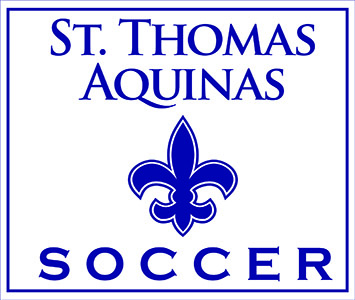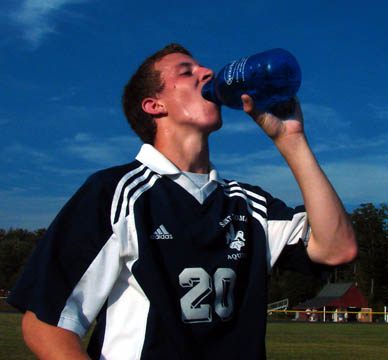

Hydration and Food Energy

In many places, not the tap water. It tastes terrible and anything that tastes terrible athletes won't drink enough of. Fluid replacement is a critical part of any competitive athlete's preparation for practice and competition. Insufficient fluid within the human performance machine can cause the following compromises:
| Mental dullness | |
| Mental and physical fatigue | |
| Muscle cramps | |
| Inefficient muscle function | |
| Heat illness | |
| Increased risk of injury as result of weakness and loss of concentration | |
| Lack of focus and attention to details | |
| Irritability |
Each athlete will react differently to low fluid levels and to fluid replacement but certain guidelines can be universally applied to all athletes. The National Athletic Trainers Association has recently set forth the minimum standard fluid replacement guidelines for athletes. These guidelines are based on the most recent scientific evidence available and now establish a standard of care for fluid replacement for pre-event, during activity and post activity. The guidelines are as follows:
Ideal fluid for athletic events should have:
| |||||||||||||
Assessment of Hydration Status should be based on:
| |||||||||||||
| Avoid fruit juices/sodas/Carbohydrate Drinks/ Caffeine/Carbonated Fluids during and prior to competition. (these fluids can increase rate of dehydration, reduce fluid absorption and cause gastric distress) | |||||||||||||
| Fluid must be available and palatable to athlete | |||||||||||||
| Cool beverages 50 to 59 degrees | |||||||||||||
| Pre-event recommendations are 500+ml (water or ideal fluid) 2 hours before event (this allows ample time to urinate excess fluids) for fully hydrated athletes. 10 to 20 minutes 7-10 oz of ideal fluid | |||||||||||||
| Rehydration during exercise or competition: Drink when thirsty or as event allows. Generally every 10 to 20 minutes during practice. Drink often and slightly more than necessary to quench thirst. Use Water or ideal fluid | |||||||||||||
| Rehydration after event or practice: Drink 20 to 24 oz of ideal fluid per pound of weight loss. 150% of weight loss results in optimal hydration at 6 hours. Do not depend on water alone. Replenishing glycogen and fluid volume is critical to enhance performance and prepare your body for the next event or practice. Your fluid replacement is part of your preparation. | |||||||||||||
| Avoid use of rubber suits, exercising in sauna or any external means of dehydrating body weight. |
These guidelines are not hard fast rules and each athlete needs to determine optimal hydration.
Drink Water and Gatorade before the game, but drink water during the game.
Avoidance of "energy drinks" or energy supplements should also be strongly considered, these may contain high levels of caffeine, ephedrine and glucose all of which may have detrimental effects. Caffeine is a stimulant that can make athletes nervous or over stimulated while exercising this along with it acting as a diuretic make this drug something to avoid. Ephedrine has the effect of increasing our internal metabolism. When we increase metabolism several things can happen; first we increase the amount of fuel we use, therefore, the soccer player may run out of energy prematurely. Secondly, this increase in metabolism will increase our internal temperature making the athlete increasingly prone to heat illness.
Energy drinks also have extremely high quantities of glucose, whereas, glucose is a fuel for our body when taken in high concentration before athletics it can have a two-fold negative effect. The first of which is causing a rapid increase in the sugar level of the blood, this is followed by a rapid increase in insulin by the pancreas, once this happens the blood sugar level rapidly decreases causing lack of fuel for performance. Secondly, if carbohydrate drinks are more then 6% in concentration there is a slowing of the stomach and its ability to digest food and water. Therefore, the fluid will be left in the stomach longer which may give the athlete an uncomfortable feeling of a full stomach and more importantly will delay the fluid getting into the circulation of the body which may lead to dehydration.
Timing is an important aspect of any pre-game meal. When to eat is almost as important as what you eat. This is because if you eat too early the sugars in that food are used up by the time you compete, therefore, you will feel like you have no fuel in your body. However, if you eat too close to game time you will be carrying food in your stomach while you play, as the stomach will start to slow its rate of digestion once exercise begins. This could make you feel sick to your stomach while you play.
So what is the best time to eat? Well most people believe the optimal timing is somewhere between two and three hours for solid food. Water and sports drinks can be consumed right up to the beginning of a game. Most trainers advocate drinking 8-16 oz about 20 minutes before the game.
A small snack about 1 hour before the game may also be advocated. This snack should be one that has a very quickly digested, or has a high glycemic index (see below).
2 - 3 hours before event:
Foods high in carbohydrates with a small amount of lean meat, or perhaps a small amount of dairy. Make sure the meal is low in fat (not over 10%) and ensure that all meals include a 16oz glass of water.
Examples:
Lean meat sandwich
Yogurt and a bagel
Pasta with a non cream sauce
Pancakes with syrup
Bagel with jelly and or a little peanut butter
1 hour before event:
Foods high in carbohydrates, no meat, low in fat and easily digestible.
Examples:
Yogurt
Bread
Dry Cereal (low fiber)
Sports Beverages
Crackers
There are several different types of carbohydrates, for the purpose of this article we will separate them according to their glycemic index, this represents the rate of breakdown & release of sugar into the body. The slower a food digests the lower the glycemic effect. For the 2-3 hours prior meal, low glycemic foods will provide longer sustained amounts of energy. Whereas, for energy just prior to the event (1 hour before) foods with a high glycemic effect would be most appropriate.
| Low Glycemic Index | Moderate Glycemic Index | High Glycemic Index |
| Rice | Rice Cakes | Glucose |
| Plums | Vanilla wafers | Carrots |
| Dairy Foods | Bagels | White Potatoes |
| Apples | Crackers | Honey |
| Dried Beans | Soda | Corn Cereal |
| Pastas | Cakes/Cookies | White Bread |
| Peaches | Wheat bread | Corn Chips |
| Fructose | Sugar | Sports Drinks |
| Nuts | Ice Cream | |
| Sweet Potatoes |
Foods high in fiber or fat tend to slow down the absorption of food. Food that is high in protein may lead to premature dehydration. You should also avoid foods that may cause gas or foods that are unfamiliar to you. Also try to avoid caffeine, and foods that are really spicy.
![]() Team Pages
Team Pages
![]() Team History - Honors &
Awards
Team History - Honors &
Awards
![]() Coaches
Coaches
If you are going to order from Soccer.com (Eurosport) click on this link - by going through our site the Team will earn credit.

goSTAsoccer.com the home of St. Thomas Aquinas Boys Soccer team
St. Thomas Athletics main site
St. Thomas Aquinas High School
197 Dover Point Road, Dover, NH 03820 603-742-3206
Copyright 2008-15